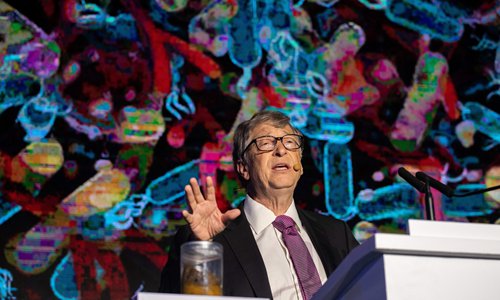Bill Gates optimistic about COVID-19 recovery by cooperating with partners including China
Source: Global Times Published: 2020/9/16 1:39:09

Microsoft founder Bill Gates talks next to a bottle containing human feces, with a backdrop depicting microscopic germ cells during the “reinvented toilet expo” in Beijing in July. File Photo: AFP
Bill Gates, co-chair of the Bill & Melinda Gates Foundation, has called for closer global cooperation to cope with the COVID-19 pandemic on Tuesday, while recognizing China has an "indispensable role" in joint efforts to "help the world address health and development challenges."
"I am optimistic about our ability to regain the ground we've lost by cooperating with our partners around the world, including China," Gates said in a video of his foundation's "2020 Goalkeepers Report" on Tuesday
In April, the World Health Organization, governments around the world, and other partners - including Bill & Melinda Gates Foundation - launched the Access to COVID-19 Tools Accelerator (ACT-A), a global collaboration to develop diagnostics, therapeutics, and vaccines and to make sure they are delivered equitably to those who need them the most, no matter where they live or how little money they have.
WHO Director-General Tedros Adhanom Ghebreyesus said on August 24 more than 170 countries have expressed readiness to join the COVID-19 Vaccine Global Access Facility (COVAX) facility, a platform designed to ensure rapid, fair and equitable access to COVID-19 vaccines deemed effective worldwide.
Chinese Foreign Ministry spokesperson Zhao Lijian said at a regular press meeting on August 25 that China firmly supports developing countries' efforts in the health sector and honors its pledge of turning a COVID-19 vaccine into a global public good.
The Gates foundation's 2020 Goalkeepers Report, shows global vaccination coverage has dropped from 84 percent to 70 percent, a 25-year setback in just 25 weeks.
The Foundation's data partner, the Institute for Health Metrics and Evaluation (IHME), found that in 2020 vaccination coverage is dropping to levels last seen in the 1990s.
"One of the most important questions the world now faces is how quickly low-income countries can catch back up to where they were and start making progress again. The hardest-hit will need support to make sure that what should be temporary reversals don't become permanent," said the report.
"Developing and manufacturing vaccines won't end the pandemic quickly unless we also deliver them equitably. Some governments that have made bets will win those bets, but if they use all the available vaccine to protect only their people, they will be extending the life of the pandemic everywhere. They will also be contributing to a much larger death toll," the report argued.
According to modeling from Northeastern University, if rich countries buy up the first 2 billion doses of a coronavirus vaccine, instead of making sure they are distributed in proportion to the global population, then almost twice as many people could die from COVID-19, said the report that also called for more countries to join the COVAX Facility.
IHME estimates that extreme poverty is up 7 percent in just a few months because of COVID-19, ending a 20-year streak of progress. Already in 2020, the pandemic has pushed almost 37 million people below the $1.90 a day extreme poverty line. The poverty line for lower-middle-income countries is $3.20 a day, and 68 million people have fallen below that line since last year.
Posted in: CROSS-BORDERS